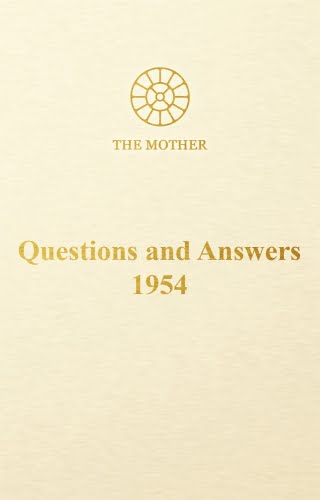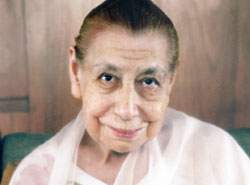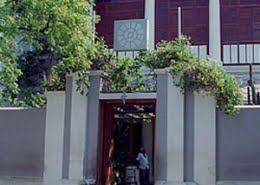Questions and Answers 1954 (CWM Vol.6)
Questions and Answers 1954
Collected Works of the Mother Volume 6
This volume comprises talks given by the Mother in 1954 to the members of her French class. Held on Wednesday evenings at the Ashram Playground, the class was composed of sadhaks of the Ashram and students of its school. The Mother usually began by reading out a passage from one of her essays or a French translation of one of Sri Aurobindo’s writings; she then commented on the passage or invited questions. During this year she discussed several of her essays on education and three small books by Sri Aurobindo: Elements of Yoga, The Mother, and Bases of Yoga. She spoke only in French.
The Mother’s French classes cover the eight-year period from 1950 to 1958. The Wednesday classes of 1950-51 and 1953-58 comprise the “Questions and Answers” talks. Between June 1951 and March 1953 these classes were replaced by “translation classes” in which the Mother translated into French several of Sri Aurobindo’s works, including The Ideal of Human Unity, The Human Cycle, part of The Synthesis of Yoga and the last six chapters of The Life Divine. During this period, she continued to speak informally with the students, but what she said was not tape-recorded.
Book Details
Author: The Mother
Print Length: 484 pages
Publisher: Sri Aurobindo Ashram
Book format: PDF, ePub, Kindle
Language: English
Book Download
Contents
27 January 1954
- Does the body express one’s character?
- Children and the psychic
- The power of observation
3 February 1954
- The senses and super-sense
- Children can be moulded
- Keeping things in order
- The shadow
10 February 1954
- Study a variety of subjects
- Memory
- Memory of past lives
- Getting rid of unpleasant thoughts
17 February 1954
- Experience expressed in different ways
- Origin of the psychic being
- Progress in sports
- Everything is not for the best
24 February 1954
- The manifestation is progressive
- Depression
- Psychic contact
- Liberation and humanity
- ABC of the transformation of the body
3 March 1954
- Occultism
- A French scientist’s experiment
10 March 1954
- Death
- Death and determinism
- Fear
- The domain of death
- Stones falling on Sri Aurobindo’s house
17 March 1954
- Ascetic practices
- Two kinds of submission
- The Kali of Virampatnam
- Kali
- Cruelty
- Rodin
24 March 1954
- Dreams and the condition of the stomach
- Tobacco and alcohol
- Nervousness
- The centres and the Kundalini
- Control of the senses
31 March 1954
- Three sources of vital energy
- Educating the senses
- A child brought up by a wolf
7 April 1954
- Communication without words
- Uneven progress
- Words and the Word
14 April 1954
- Love
- Can a person love another truly?
- Parental love
21 April 1954
- Physical transformation
- Activity and passivity
- The body: most capable of perfection
28 April 1954
- Aspiration and receptivity
- Resistance
- Purusha and Prakriti: not masculine and feminine
5 May 1954
- Faith, trust, confidence
- Insincerity and unconsciousness
12 May 1954
- The Purusha
- Surrender
- Distinguishing between influences
- Perfect sincerity
19 May 1954
- Affection and love
- Psychic vision Divine
- Love and receptivity
- Get out of the ego
26 May 1954
- Symbolic dreams
- Psychic sorrow
- Dreams: one is rarely conscious
2 June 1954
- Learning how to live
- Work, studies and sadhana
- Waste of the Energy and Consciousness
9 June 1954
- Dreams do not transform the nature
- Eating habits in the Ashram
- The earth and the psychic being
- Mother’s awareness of people
16 June 1954
- Influences: Divine and other
- Adverse forces
- The four great Asuras
- Aspiration arranges circumstances
- Wanting only the Divine
23 June 1954
- Meat-eating
- Story of Mother’s vegetable garden
- Faithfulness
- Conscious sleep
30 June 1954
- Occultism
- Religion and vital beings
- Mother’s knowledge of what happens in the
- Ashram
- Asking questions to Mother
- “Drawing” on Mother
7 July 1954
- The inner warrior
- Grace and the Falsehood
- Opening from below
- Surrender and inertia
- Exclusive receptivity
- Grace and receptivity
14 July 1954
- The Divine and the Shakti
- Personal effort
- Speaking and thinking
- Doubt
- Self-giving, consecration and surrender
- Mother’s use of flowers
- Ornaments and protection
21 July 1954
- Mistakes
- Success
- Asuras
- Mental arrogance
- Difficulty turned into opportunity
- Mother’s use of flowers
- Conversion of men governed by adverse forces
28 July 1954
- Money
- Ego and individuality
- The shadow
4 August 1954
- Servant and worker
- Justification of weakness
- Play of the Divine
- Why are you here in the Ashram?
11 August 1954
- Division and creation
- The gods and human formations
- People carry their desires around them
18 August 1954
- Mahalakshmi
- Maheshwari
- Mahasaraswati
- Determinism and freedom
- Suffering and knowledge
- Aspects of the Mother
25 August 1954
- Ananda aspect of the Mother
- Changing conditions in the Ashram
- Ascetic discipline
- Mother’s body
8 September 1954
- Hostile forces
- Substance
- Concentration
- Changing the centre of thought
- Peace
15 September 1954
- Parts of the being
- Thoughts and impulses
- The subconscient
- Precise vocabulary
- The Grace and difficulties
22 September 1954
- The supramental creation
- Rajasic eagerness
- Silence from above
- Aspiration and rejection
- Effort, individuality and ego
- Aspiration and desire
29 September 1954
- The right spirit
- The Divine comes first
- Finding the Divine
- Mistakes
- Rejecting impulses
- Making the consciousness vast
- Firm resolution
6 October 1954
- What happens is for the best
- Blaming oneself
- Experiences
- The vital desire-soul
- Creating a spiritual atmosphere
- Thought and Truth
13 October 1954
- The witness position
- The silent Self
- Experience of “All is Divine”
- Illness is remembered by the body
- Personal conflicts and the divine Will
20 October 1954
- Stand back
- Asking questions to Mother
- Seeing images in meditation
- Berlioz
- Music
- Mother’s organ music
- Destiny
3 November 1954
- Body opening to the Divine
- Concentration in the heart
- The army of the Divine
- The knot of the ego
- Strengthening one’s will
10 November 1954
- Inner experience: the basis of action
- Keeping open to the Force
- Faith through aspiration
- The Mother’s symbol
- The mind and vital seize experience
- Degrees of sincerity
- Becoming conscious of the Divine Force
17 November 1954
- Impersonal and personal Divine
- Looking at oneself
- Faith and trust
- Abhimana
- Physical suffering
24 November 1954
- Aspiration mixed with desire
- Willing and desiring
- Children and desires
- Supermind and the higher ranges of mind
- Stages in the supramental manifestation
8 December 1954
- Cosmic consciousness
- “Clutching”
- The central will of the being
- Knowledge by identity
15 December 1954
- Many witnesses inside oneself
- Children in the Ashram
- Trance and the waking consciousness
- Ascetic methods
- Education: spontaneous effort
- Spiritual experience
22 December 1954
- Possession by hostile forces
- Purity and morality
- Faith in the final success
- Drawing back from the path
29 December 1954
- Difficulties and the world
- The experience the psychic being wants
- After death
- Ignorance
31 December 1954
- 1955-1956: fourteen difficult months
- Human will and the divine Will
- Difficulties and the Divine
Book Sample
Questions and Answers 1954
27 January 1954
This talk is based upon Mother’s essay “Physical Education”.
Mother, does a person’s body-formation express his character?
No. Even the character itself is not a simple affair, that is, the character of a person is not the expression of his true being but the result of many things. For example, atavism may be expressed, that is, what comes from the father, the mother, from both together which may have a different result; from the antecedents — the past history, grandfathers, great-grandfathers, etc., and then from the environment in which people have lived when they were very young and had no independence at all. That has a considerable effect on the character. And this character affects the physical formation. So, just by seeing somebody one cannot quite say what his true nature is. One may describe his tendencies, know his difficulties, his possibilities, but it is only with the growth of the consciousness and as the development becomes voluntary and organised that the body can begin to express the true character of the person.
And when the body has been deformed by illness?
That may be an accident, you know. Accidents are due to many things; in fact they are the result of a conflict of the forces in Nature, a conflict between the forces of growth and progress and the forces of destruction. When there is an accident, an accident that has lasting results, it is always the result of a more or less partial victory of the adverse forces, that is, of the forces of disintegration, disorganisation. It depends.
There are teachings, like that of theosophy for instance, which take Karma in an altogether superficial and human sense and tell you: “Oh! You have met with this accident because in a former life you did something bad, so that comes back upon you in the form of an accident.” This is not true, not at all true. This is but human justice, it is neither the justice of Nature nor the justice of the Divine.
Naturally the formation of the body is very important in this sense that if, for instance, one is constantly under the influence of a depression, of pessimism, discouragement, a lack of faith and of trust in life, all this enters, so to say, into one’s substance, and then some people, when there is the possibility of an accident, never miss it. Every time there is a chance of something happening to them, they catch it, be it an illness or an accident. You have a whole field of observation here — it is always the same people who meet with accidents. Others do the same things, have as many chances of having an accident, but they are not touched. If you observe their character you will see that the former have a tendency to pessimism and more or less expect something unpleasant to happen to them — and it happens. Or else they are afraid. We know that fear always brings what one fears. If you fear an accident, this acts like a magnet drawing the accident towards you. In this sense, it may be said that it is the result of character. And the same thing holds for illness. There are people who can move about among the sick and in places where there are epidemics and never catch a disease. There are others — it is enough for them to spend an hour with a sick person, they catch the illness. That too depends on what they are within themselves.
And for children, is it also the same thing?
One cannot say. It is a moral question. The problem should not be judged from a moral point of view, one should not say that those who always enjoy good health and to whom nothing happens are “good children” and those who meet with accidents and suffer catastrophes are “bad”. That is not correct. For, as I was saying, the logic of Nature is not human logic and its sense of justice (if it has any) is not a human sense. For it there is very little of what we call good and bad. It could rather be said that there is what is constructive and what is destructive, what is progressive and what is retrogressive. That indeed is very important. And then there are those who are luminous, sunny, happy, smiling and those who are gloomy, dull, misanthropic, dissatisfied, who live in grey shadows. It is the latter who catch all the unpleasant things. Those who are radiant (they may be radiant without it being a spiritual radiance, they may simply radiate good sense, balance, an inner confidence, the joy of living), those who carry in themselves the joy of living, these are in harmony with Nature and, being in harmony with Nature, generally avoid accidents, they are immune from diseases and their life develops pleasantly as far as it is possible in the world as it is.
…




